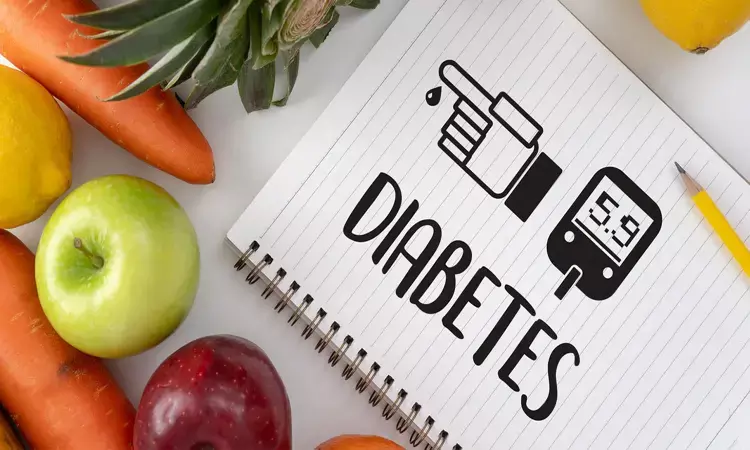- Home
- Medical news & Guidelines
- Anesthesiology
- Cardiology and CTVS
- Critical Care
- Dentistry
- Dermatology
- Diabetes and Endocrinology
- ENT
- Gastroenterology
- Medicine
- Nephrology
- Neurology
- Obstretics-Gynaecology
- Oncology
- Ophthalmology
- Orthopaedics
- Pediatrics-Neonatology
- Psychiatry
- Pulmonology
- Radiology
- Surgery
- Urology
- Laboratory Medicine
- Diet
- Nursing
- Paramedical
- Physiotherapy
- Health news
- Fact Check
- Bone Health Fact Check
- Brain Health Fact Check
- Cancer Related Fact Check
- Child Care Fact Check
- Dental and oral health fact check
- Diabetes and metabolic health fact check
- Diet and Nutrition Fact Check
- Eye and ENT Care Fact Check
- Fitness fact check
- Gut health fact check
- Heart health fact check
- Kidney health fact check
- Medical education fact check
- Men's health fact check
- Respiratory fact check
- Skin and hair care fact check
- Vaccine and Immunization fact check
- Women's health fact check
- AYUSH
- State News
- Andaman and Nicobar Islands
- Andhra Pradesh
- Arunachal Pradesh
- Assam
- Bihar
- Chandigarh
- Chattisgarh
- Dadra and Nagar Haveli
- Daman and Diu
- Delhi
- Goa
- Gujarat
- Haryana
- Himachal Pradesh
- Jammu & Kashmir
- Jharkhand
- Karnataka
- Kerala
- Ladakh
- Lakshadweep
- Madhya Pradesh
- Maharashtra
- Manipur
- Meghalaya
- Mizoram
- Nagaland
- Odisha
- Puducherry
- Punjab
- Rajasthan
- Sikkim
- Tamil Nadu
- Telangana
- Tripura
- Uttar Pradesh
- Uttrakhand
- West Bengal
- Medical Education
- Industry
Intensive exercise lowers blood sugar by improving Beta-cell function in diabetes: Study

According to recent research, incorporating an intensive lifestyle intervention with high volumes of exercise, in individuals with type 2 diabetes has the potential to improve the beta-cell function and blood sugar control.
The study is published in the Diabetologia journal.
It is unclear whether a lifestyle intervention can maintain blood sugar control in patients with type 2 diabetes. This indicates that although the Diabetes Prevention Program (DPP) has established lifestyle changes (diet, exercise and weight loss) as the 'gold standard' preventive therapy for diabetes, the relative contribution of exercise alone to the overall utility of the combined diet and exercise effect of DPP is still unknown; furthermore, the optimal intensity of exercise for preventing progression to diabetes remains very controversial.
Therefore, Mette Y Johansen and colleagues from the Centre of Inflammation and Metabolism and the Centre for Physical Activity Research, University of Copenhagen, Copenhagen, Denmark conducted a study which aimed to investigate whether an intensive lifestyle intervention, with high volumes of exercise, improves beta-cell function and further, to explore the role of low-grade inflammation and body weight.
The study was a randomized, assessor-blinded, controlled trial including ninety-eight individuals with type 2 diabetes (duration <10 years) having a BMI of 25-40 kg/m2. The patients did not have a history of insulin intake and them were taking fewer than three blood sugar-lowering medications which were randomized (2:1) to either the standard care plus intensive lifestyle group or the standard care alone group.
Standard care consisted of individual guidance on disease management, lifestyle advice, and blinded regulation of medication following a pre-specified algorithm whereas the intensive lifestyle intervention consisted of aerobic exercise sessions that took place 5-6 times per week, combined with resistance exercise sessions 2-3 times per week, with a concomitant dietary intervention aiming for a BMI of 25 kg/m2.
Based on the analysis, the following findings were noted-
- The intensive lifestyle group showed 40% greater improvement in the disposition index compared with the standard care group from baseline to 12 months' follow-up.
- Plasma concentration of IL-1 receptor antagonist (IL-1ra) decreased 30% more in the intensive lifestyle group compared with the standard care group.
- Statistical single mediation analysis estimated that the intervention effect on the change in IL-1ra and the change in body weight explained to a similar extent (59%) the variance in the intervention effect on the disposition index.
Dr. Nandita Mohan is a practicing pediatric dentist with more than 5 years of clinical work experience. Along with this, she is equally interested in keeping herself up to date about the latest developments in the field of medicine and dentistry which is the driving force for her to be in association with Medical Dialogues. She also has her name attached with many publications; both national and international. She has pursued her BDS from Rajiv Gandhi University of Health Sciences, Bangalore and later went to enter her dream specialty (MDS) in the Department of Pedodontics and Preventive Dentistry from Pt. B.D. Sharma University of Health Sciences. Through all the years of experience, her core interest in learning something new has never stopped. She can be contacted at editorial@medicaldialogues.in. Contact no. 011-43720751
Dr Kamal Kant Kohli-MBBS, DTCD- a chest specialist with more than 30 years of practice and a flair for writing clinical articles, Dr Kamal Kant Kohli joined Medical Dialogues as a Chief Editor of Medical News. Besides writing articles, as an editor, he proofreads and verifies all the medical content published on Medical Dialogues including those coming from journals, studies,medical conferences,guidelines etc. Email: drkohli@medicaldialogues.in. Contact no. 011-43720751


